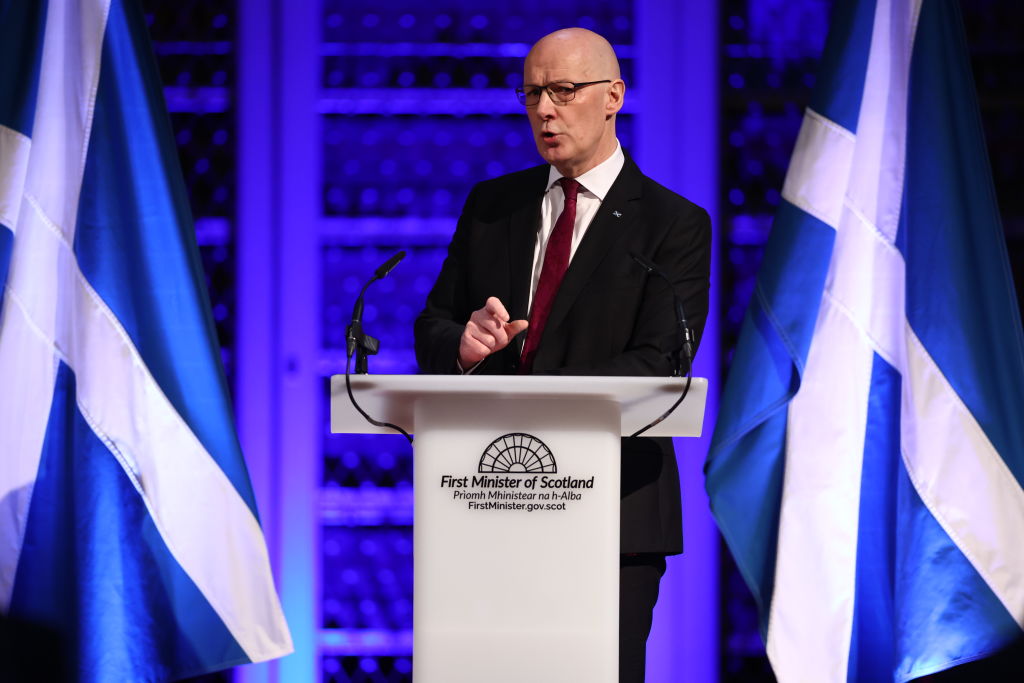To mutilate the words of PG Wodehouse, it is never difficult to distinguish between a Scottish nationalist with a grievance and a ray of sunshine. Fury is the fuel that drives the SNP, which has been in power at the Scottish parliament for 18 years. So it is hardly a surprise that First Minister John Swinney has reacted angrily to the new deal struck between the United Kingdom and the European Union.
The agreement reached between Prime Minister Sir Keir Starmer and European Commission president Ursula von der Leyen will increase freedom of movement, create closer relationships between businesses, and increase cooperation on food standards. These are things that the SNP has been demanding ever since the UK voted, in 2016, to leave the EU. But the decision to maintain the status quo of EU fishing boats having access to UK waters until 2038 undermines all of that so far as the First Minister and his colleagues are concerned.
The SNP’s faux rage was further weakened when representatives of Scotland’s salmon industry welcomed the new deal.
‘Scotland’s fishing industry,’ declared Swinney, as details of the agreement filtered through, ‘has been undermined by the UK government again.’ Labour has treated Scotland’s fishing communities as expendable. And guess what? Only independence would allow Scotland’s interests to be defended. The SNP’s external affairs secretary, Angus Robertson, is on the same page. The UK government had agreed a fisheries deal, in principle, with the EU without recourse to, or the involvement and approval of devolved administrations. This statement of outrage is rendered ludicrous by the fact that international relations are a matter for Westminster.
The nationalists’ faux rage was further weakened when representatives of the salmon industry welcomed the new deal. Salmon Scotland said it would reduce costly delays and red tape. In a statement released shortly after Starmer’s midday announcement, chief executive of Salmon Scotland Tavish Scott congratulated the UK government the EU deal, lauding it as a ‘breakthrough’ adding:
[It] eases the burden on our farmers, processors and the communities they support, and we welcome efforts to implement it at pace. The withdrawal of physical checks is particularly welcome. It means lower costs and quicker deliveries for our customers. Scottish salmon is the UK’s biggest food export, with strong demand in the EU, the US and beyond. We look forward to rebuilding trade ties across Europe and will continue to press for freer access to the US and other markets to support jobs and growth in our coastal communities.
Not that the approval of those behind the UK’s biggest food export suits the nationalist narrative. When the UK backed Brexit, despite a majority of Scots voting ‘remain’, the SNP, quite understandably, saw an opportunity. On the day after the referendum, then First Minister Nicola Sturgeon said the result had created the circumstances in which a second vote on Scottish independence was necessary. But despite continual nationalist rhetoric about Scotland being ripped out of Europe against its will and of democracy denied, support for the break-up of the Union did not begin to soar. Scots may have wished to remain in the EU, but not so much that they thought Scexit a wise response to Brexit.
The SNP’s Westminster leader Stephen Flynn seems to believe things have changed. He insisted today, shortly after the details of the UK-EU deal emerged, the agreement was an admission from Starmer’s Labour government that Brexit has been a ‘disaster’ for the UK. Yet today’s deal has failed to deliver the ‘only cure’: to rejoin the European Union. Flynn – choosing to ignore how referendums work – declared the Labour government had taken the ‘catastrophic decision’ to stay out of the EU. ‘The limited measures announced,’ said Flynn, ‘do not come anywhere near close to repairing the hammer blow that Brexit will continue to inflict on our public finances.’ Then came his inevitable conclusion: the best deal for Scotland is for it to become a member of the EU as an independent country.
Behind all the bluster, there is a fundamental flaw with the SNP’s argument that out of all Scotland’s different political parties only it wishes to rest the national head on the European bosom. After all, in 2014, the party campaigned for an independence result that would have seen Scotland leave the EU. Had Scotland voted for independence 11 years ago, the new state would not have retained the membership of the EU that it had enjoyed as part of the UK. This is a simple matter of fact.
For those – and I count myself among them – who believe Brexit was a mistake, a return to membership of the EU remains desirable. But the SNP’s claim that independence will make that a reality remains nonsense. Scotland outside the UK would have no automatic right to rejoin. Indeed, the financial impact of breaking from the Union would mean we’d actually struggle more to meet the criteria required for entry.
The First Minister may wish to characterise this latest agreement with the EU as yet another betrayal but his motives are too transparent. The fact is that the UK has been able to strike a deal that gets the SNP a lot of what it has been demanding for the best part of a decade.








Comments